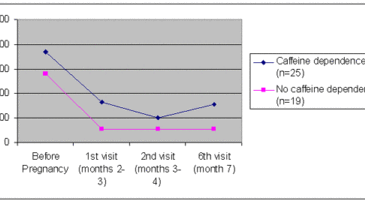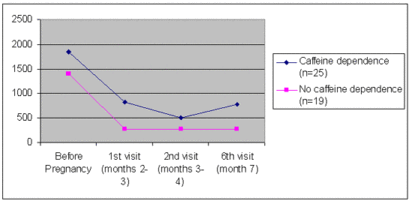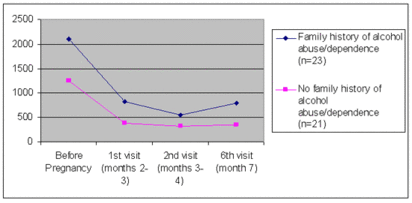Adults and children widely consume caffeine through a variety of foods and beverages. The average adult caffeine consumer in the United States takes in approximately 280 mg of caffeine every day, the equivalent of three 6-oz. cups of coffee or five 16-oz. bottles of cola (Barone & Roberts, 1996; Griffiths, Juliano, & Chausmer, 2003). When compared to other drugs caffeine is a relatively safe substance. However, caffeine can occasionally create serious health problems. For example, consumption of caffeine during pregnancy has been associated with a variety of adverse consequences, including spontaneous abortion, and low birth-weight (Eskenazi, 1999). Physicians generally recommend that pregnant women reduce or stop consumption of caffeine during pregnancy due to these possible risks; however, some women have difficulty doing so. This week, STASH reviews a study by Svikis, Berger, Haug and Griffiths (2005) that reports how continued use of caffeine during pregnancy is related to both a history of caffeine dependence and a family history of alcohol abuse.
The participants in this study were pregnant women seeking prenatal care from a private OB-GYN practice in a suburban community; all women waiting for their first clinic visit were invited to participate. Of the 109 eligible participants, 100 agreed to participate. They completed a 20 minute questionnaire. Eighty-three of the original 100 completed two follow-up questionnaires, at 12-16 weeks and 28 weeks after conception. To validate accuracy of questionnaires, participants provided 5-ml saliva samples during each of the three office visits. Forty-four of these 83 participants also completed a personal interview consisting of the Structured Clinical Interview for DSM-III-R and the Family Alcohol and Drug Survey. All women, in the final group of 44 participants, reported some caffeine use before becoming pregnant; 25 met criteria for lifetime caffeine dependence, 8 met criteria for lifetime, but not current, alcohol abuse or dependence, 3 met criteria for lifetime substance abuse or dependence (to drugs other than caffeine or nicotine), and 12 had a history of daily cigarette smoking (3 smoked tobacco during pregnancy). Twenty-three of the women in the final sample reported having a first-degree relative who met criteria for alcoholism.
In response to the warnings from their obstetrician that caffeine could harm unborn children, 98% of the women reported that they tried to stop or limit their use of caffeine while pregnant. However, not all of them were able to do so: 57% of the group had a lifetime diagnosis of caffeine dependence; of those women, 43% continued to consume caffeine during their pregnancy, and 45% had a persistent desire to use and could not stop or reduce their use. Overall, women with a lifetime diagnosis of caffeine dependence did not reduce their intake as much as women who did not have a history of caffeine dependence. Similarly, women with a family history of alcohol abuse/dependence did not reduce their consumption of caffeine as much as those who did not have the same family history. Many of those who were unable to stop or reduce their use reported signs of dependence, such as withdrawal, cravings, and functional impairment.
Figure. Table 1 shows estimated caffeine consumption (mg/week) in women with and without lifetime caffeine dependence (adapted from Svikis et al., 2005) Table 2 shows estimated caffeine consumption (mg/week) in women with and without a family history of alcohol abuse/ dependence (adapted from Svikis et al., 2005). Click image to enlarge.
There are several limitations to the study. The sample size (44 people) is very small. This circumstance limits the generalizability of the results. The women in the study were predominantly well-educated, employed, Caucasian women, with a low rate of substance related problems; the homogeneity of the sample further limits the generalizability of the results.
Nonetheless, the results of this study have important implications. Many of the pregnant women in this study who attempted to limit or reduce their caffeine consumption were unable to do so. The women in the study who met diagnostic criteria for lifetime caffeine dependence and consumed caffeine during pregnancy, all had a family history of alcohol dependence, and were more likely to meet criteria for other lifetime addictions. This finding suggests that there is a shared genetic vulnerability that incorporates addiction more generally, not only addiction to a particular substance. The idea of the existence of a genetic vulnerability to addiction is one component of the syndrome model of addiction (Shaffer et al., 2004). The syndrome model suggests that various expressions of addiction arise from similar causes; objects of addiction (e.g., cigarettes or slot machines) are less important to the development of addiction than previously thought (see WAGER 10(1)). Thus, findings from this study have important implications for the treatment of substance use problems before, during and after pregnancy.
What do you think? Please use the comment link below to provide feedback on this article.
________________
[1] Twelve participants dropped out due to miscarriage, change in obstetrician, or decision to discontinue study participation; four dropped out for “unknown reasons”; and one woman was excluded from the study because she provided contradictory information
[2] Sixty-five agreed to participate and 50 of them completed the interview; of the 50 interviews, 5 excluded because they reported no caffeine use during pregnancy, another was excluded due to miscarriage.
References
Barone, J. J., & Roberts, H. R. (1996). Caffeine Consumption. Food and Chemical Toxicology, 34, 119-129.
Eskenazi, B. (1999). Caffeine: Filtering the Facts. New England Journal of Medicine, 341(22), 1688-1689.
Griffiths, R. R., Juliano, L. M., & Chausmer, A. L. (2003). Caffeine pharmacology and clinical effects. In A. W. Graham, T. K. Schultz, M. F. Mayo-Smith, R. K. Ries & B. B. Wilford (Eds.), Principles of Addiction Medicine, 3rd ed. (pp. 193224). Chevy Chase, MD: American Society of Addiction.
Shaffer, H. J., LaPlante, D. A., LaBrie, R. A., Kidman, R. C., Donato, A., & Stanton, M. V. (2004). Toward a syndrome model of addiction: Multiple manifestations, common etiology. Harvard Review of Psychiatry, 12(6), 367-374.
Svikis, D. S., Berger, N., Haug, N. A., & Griffiths, R. R. (2005). Caffeine Dependence in Combination with a Family History of Alcoholism as a Predictor of Continued Use of Caffeine During Pregnancy. American Journal of Psychiatry, 162, 2344-2351.






